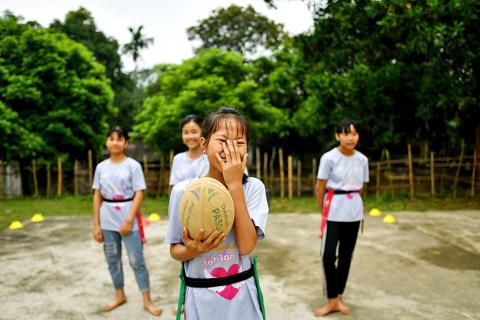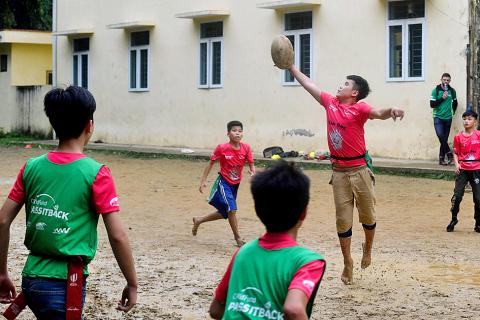Barefoot and muddied, a group of youngsters sprinted across a makeshift pitch in rural Vietnam, passing the ball in a game of touch rugby in a country where few people have ever heard of the sport.
They belong to Vietnam’s only rugby program for locals, rolled out for kids in a remote commune where some players have to travel by boat to training sessions often held against a backdrop of rice terraces and curious onlookers.
Few knew anything about rugby when they joined the scheme, marveling at the egg-shaped ball, but are now keen fans planning to closely follow the Rugby World Cup in Japan, which starts in September.

Photo: AFP
“I haven’t watched international rugby ... but if possible I will surely watch the Rugby World Cup,” said 14-year-old Bao Cham, a player on the Silver Fox team in Kim Boi District.
With the first Rugby World Cup held in Asia, organizers are hoping to boost rugby’s popularity in backwaters like Kim Boi, where most kids count Lionel Messi as a hero, but have never heard of New Zealand great Dan Carter.
Vietnam is one of the few countries in Southeast Asia with no rugby federation, and international games are not regularly aired on cable TV.

Photo: AFP
That means the sport remains on the margins, making the rugby clinic in Kim Boi something of an oddity.
Launched in 2015, the ChildFund Pass It Back program is aimed at teaching youngsters life skills, with lessons on health or planning for the future interspersed with rugby training sessions.
The players, aged 11 to 16, meet regularly on weekends to play touch rugby, which has none of the full-contact version’s heavy tackling.
There are more than 6,100 players and coaches in the program today, more than half of them female, in Vietnam, Laos, East Timor and the Philippines.
Some players will go to Japan with ChildFund — traveling by airplane for the first time — for rugby training and life skills sessions.
Rugby was not the most obvious choice. Soccer, volleyball and sepak takraw (kick volleyball) were also floated as options when the program was piloted in Laos, but rugby was considered the most gender-neutral.
“The young girls in the commune wanted to try this new sport that they had never seen before, it wasn’t considered a boys’ sport,” said John Harris, regional operations officer for the scheme.
Still, some participants in Vietnam had to push back again entrenched sexism.
Coach Bui Thi Lan was told by her in-laws that she should give up rugby after marrying and having a baby — in line with expectations that women should avoid playing rowdy sports.
Lan would have none of it. She returned to coaching four months after giving birth and now teaches 60 kids four times per week.
“Rugby brought me money so that I could take care of myself, working and studying at the same time,” she told reporters at a training session, in which she fed her baby between modules.
Battling inequality was not the only hurdle. There was no vocabulary in Vietnamese for the sport and some terms were coined on the fly.
A scrum is mai rua, which means “turtle shell” in Vietnamese, while the name for rugby is simply bong bau duc, which translates to “oval ball.”
Rugby was not always so foreign to Vietnam, although it has never been widespread among locals. The French are believed to be the first to introduce rugby to the country, and an excerpt from a 1933 telephone book describing the Saigon Sports Stadium notes a rugby pitch with stands for 3,000 spectators.
Today there are no professional Vietnamese-born players abroad — although France flyhalf Francois Trinh-Duc is of Vietnamese origin — and just a small group of expatriates playing recreationally in Hanoi and Ho Chi Minh City.
However, the game is not totally unfamiliar in Vietnam, as it echoes aspects of the traditional vat cau new year festival that sees shirtless men wrestle for possession of a large wooden ball on a field.
Now Vietnam’s budding young rugby stars hope that the sport will start to gain popularity.
“I really wish that Vietnam would participate in Rugby World Cup one day, and I hope to be a member of that team,” 17-year-old coach Bui Van Nhan told reporters.

The lights dimmed and the crowd hushed as Karoline Kristensen entered for her performance. However, this was no ordinary Dutch theater: The temperature was 80°C and the audience naked apart from a towel. Dressed in a swimsuit and to the tune of emotional music, the 21-year-old Kristensen started her routine, performed inside a large sauna, with a bed of hot rocks in the middle. For a week this month, a group of wellness practitioners, called “sauna masters,” are gathering at a picturesque health resort in the Netherlands to compete in this year’s Aufguss world sauna championships. The practice takes its name from a

Roger Federer on Wednesday said that staying involved with tennis in retirement helped him avoid feeling “like an alien” ahead of this week’s Laver Cup in Berlin. Federer, who helped create the tournament, retired at the Laver Cup in London two years ago and has since stayed involved with the competition as an ambassador. “I’m happy I went back right away to some tournaments,” the 43-year-old told reporters. “I feel I ripped the Band-Aid off quite quickly and when I walk around the tennis sites I still feel I belong there,” he said. “I don’t feel like an alien, which is a

Japanese players are moving to English soccer in record numbers and more look set to follow with clubs attracted by their quality, strong work ethic and value for money. Kaoru Mitoma is the standout talent of five Japanese players in the English Premier League, with eight more in the Championship and two in League One. Liverpool midfielder Wataru Endo, the captain of Japan, believes his compatriots are “being held in higher esteem” by English clubs compared with the past. “The staff at Liverpool ask me about lots of Japanese players, not necessarily with a view to a transfer, but just saying this or

Taiwan yesterday survived Bosnia and Herzegovina to win their Davis Cup World Group I tie at the Taipei Tennis Center. The tight series started on Saturday with world No. 123 Jason Tseng losing 3-6, 7-5, 6-4 to Mirza Basic in the opening singles matchup. However, teammate Tony Wu kept the tie even, dominating world No. 86 Damir Dzumhur 6-2, 6-1. Yesterday, 24-year-old Ray Ho and partner 25-year-old Hsu Yu-hsiou kept up the momentum, making short work of Basic and Nerman Fatic, winning 6-3, 6-4. Tseng then suffered another defeat, losing 6-4, 2-6, 6-2 to Dzumhur in a brutal match that lasted more than two